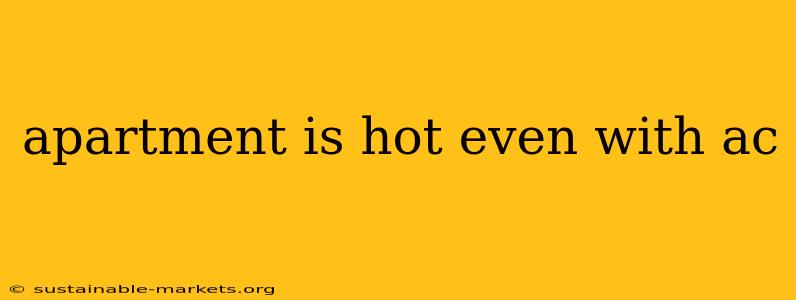Is your apartment feeling like an oven even with the air conditioner blasting? You're not alone. Many apartment dwellers face this frustrating problem, especially during heat waves. While a malfunctioning AC unit is a common culprit, there are several other factors that can contribute to a persistently hot apartment, and thankfully, many solutions. This guide will delve into the reasons why your apartment might be hotter than expected, even with the AC running, and provide practical, actionable steps to cool things down.
Common Reasons Why Your Apartment Stays Hot Despite AC
Before you call your landlord or panic, let's investigate the potential causes:
1. Inefficient or Failing AC Unit:
- Age and Maintenance: Older AC units are less efficient and may require professional maintenance or replacement. Regular filter changes are crucial, and neglecting this can significantly impact cooling performance. A dirty filter restricts airflow, forcing the unit to work harder and potentially leading to overheating.
- Refrigerant Leaks: Low refrigerant levels significantly reduce cooling capacity. A professional AC technician can identify and repair leaks.
- Frozen Evaporator Coil: Ice buildup on the evaporator coil restricts airflow and prevents efficient cooling. This often points to a problem with airflow, potentially a dirty filter or a blocked vent.
2. Poor Insulation and Air Sealing:
- Older Buildings: Many older apartment buildings lack proper insulation, allowing heat to seep in easily. Cracks and gaps in windows and doors also contribute to heat infiltration.
- External Factors: Direct sunlight hitting windows, especially those facing west or south, can drastically increase the internal temperature, overwhelming even a well-functioning AC unit.
3. Incorrect Thermostat Settings and Usage:
- Improper Thermostat Placement: A thermostat located in a poorly ventilated area might not accurately reflect the room's temperature, leading to inefficient cooling.
- Setting the Thermostat Too Low: While tempting, setting the thermostat too low won't cool the apartment faster; it will only increase energy consumption without significantly improving the temperature.
4. High Occupancy and Heat-Generating Appliances:
- Multiple Occupants: Body heat from multiple people in the apartment can contribute to a warmer environment, particularly in smaller spaces.
- Appliances and Electronics: Running appliances like ovens, stoves, and computers generate heat, which can impact the overall temperature, especially in poorly ventilated areas.
Cooling Down Your Apartment: Practical Solutions
Here's a breakdown of solutions to tackle each potential problem:
1. Addressing AC Issues:
- Check the Filter: The first and easiest step is to check and change your air filter. A clean filter dramatically improves efficiency.
- Schedule Maintenance: If the problem persists, contact a qualified HVAC technician to inspect and service your AC unit. Addressing refrigerant leaks or other mechanical issues is crucial.
2. Improving Insulation and Air Sealing:
- Window Treatments: Install blackout curtains or blinds to block sunlight and reduce heat gain.
- Seal Gaps: Use weatherstripping or caulk to seal gaps around windows and doors, preventing drafts and heat infiltration. This is especially important in older buildings.
- Consider Window Films: Energy-efficient window films can reflect sunlight and help keep your apartment cooler.
3. Optimizing Thermostat Use:
- Proper Placement: Ensure the thermostat is placed in a central location, away from direct sunlight and heat sources.
- Strategic Temperature Setting: Maintain a consistent temperature, rather than constantly adjusting it up and down. Aim for a comfortable setting, not an excessively low one. Consider a programmable thermostat for automatic temperature adjustments.
4. Managing Heat Sources:
- Limit Appliance Use: Avoid using heat-generating appliances during peak heat hours.
- Ventilation: Use exhaust fans in the kitchen and bathroom to remove excess heat and moisture.
5. Additional Cooling Techniques:
- Fans: Strategically placed fans can help circulate air and enhance the effectiveness of your AC unit. Consider a ceiling fan or several strategically positioned stand fans.
- Cooling Sheets and Pillows: These can improve your personal comfort levels, even if the overall room temperature remains slightly elevated.
By addressing these factors and implementing these solutions, you can significantly improve the cooling efficiency of your apartment and enjoy a more comfortable living environment, even during the hottest days of the year. Remember, contacting your landlord is always an option if you suspect a significant building-related issue is contributing to the problem.

